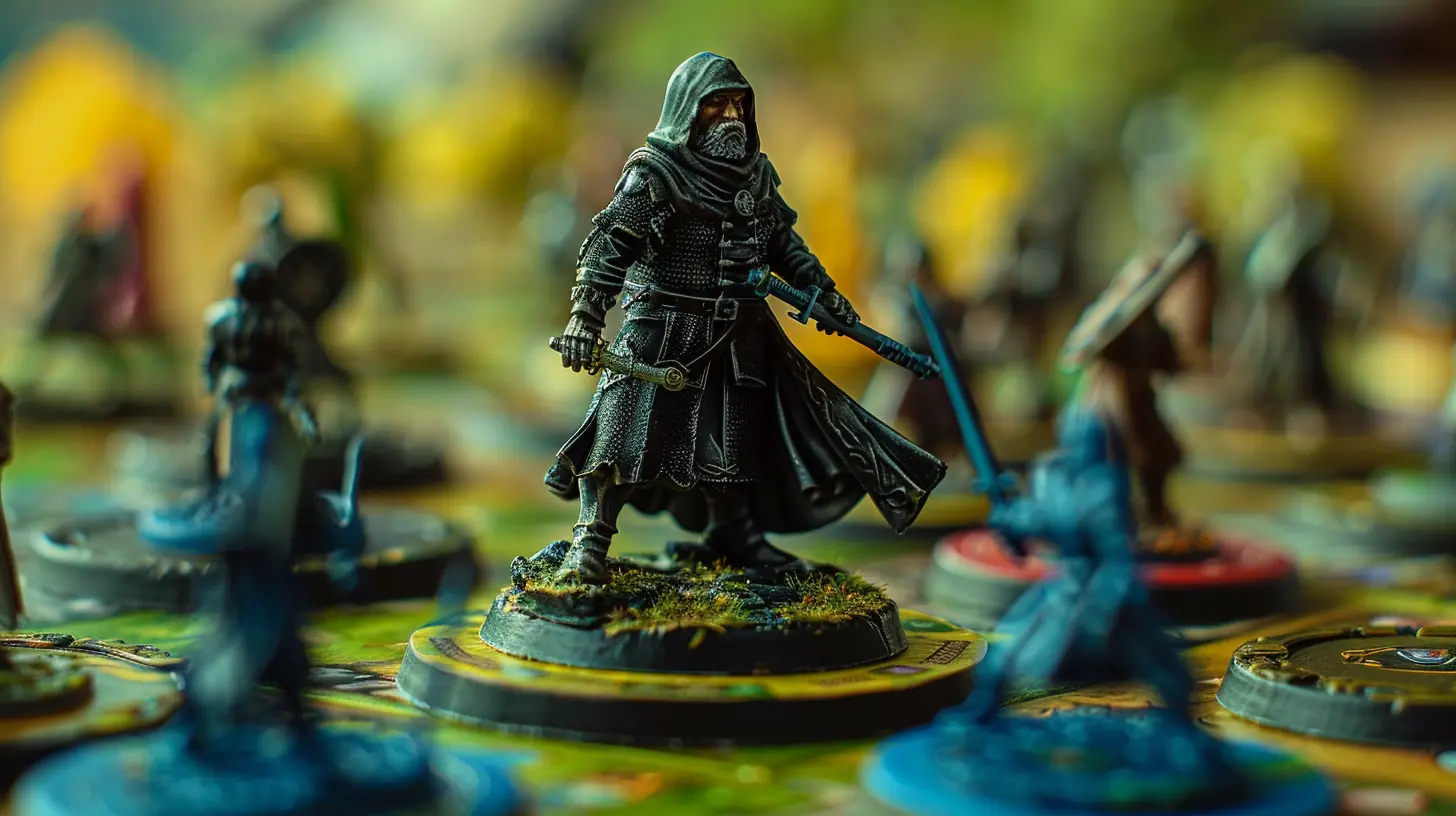Cooperative vs Competitive: Which Board Game Style Suits You?
2 March 2025
Board games have been a beloved pastime for decades. They bring people together, spark laughter, and sometimes even create a little friendly rivalry. But when it comes to picking the right type of board game for your next game night, you might end up debating: cooperative or competitive? Both styles have their perks and pitfalls, and the choice often comes down to your personality, the vibe of your group, and what kind of experience you’re aiming for.
In this article, we’re diving deep into these two board game styles, breaking them down, and helping you figure out which one suits you. So, grab your favorite snack, settle into your comfiest chair, and let’s unpack this board game conundrum.
What Are Cooperative Board Games?
Let’s start with cooperative board games. These are the type of games where you and your fellow players aren’t battling against each other – you’re teaming up to beat the game itself. The whole group wins or loses together. Think of it like forming a little squad of heroes, pooling your brainpower and strategizing together to achieve a common goal.In these games, it’s you vs. the game mechanics. Popular examples of cooperative board games include Pandemic, where you work together to stop diseases from taking over the world, or The Forbidden Island, where you must retrieve hidden treasures before the island sinks into the ocean.
Why Choose Cooperative Board Games?
So, why might a cooperative game be your thing? For starters, they’re great if you want to create a sense of camaraderie. These games can really bring people closer because everyone’s on the same side. No gloating, no hard feelings – just teamwork.Here are a few reasons cooperative games might appeal to you:
1. Team Spirit
If you love the idea of united we stand, divided we fall, cooperative games are worth considering. They’re like a trust fall, but less awkward and way more strategic.
2. Inclusive for All Skill Levels
Got a mix of gaming pros and total newbies at the table? No worries. These games let everyone contribute without feeling left out or overshadowed. After all, it’s not about competing; it’s about collaborating.
3. Less Stressful Environment
Ever had a cutthroat game of Monopoly ruin a perfectly good game night? Cooperative games minimize the stress since there’s no one to “beat”. It’s just you and your teammates tackling a shared challenge.
4. Great for Kids and Families
Cooperative games are perfect for younger players since they emphasize problem-solving and teamwork without the frustration of losing to an older sibling (we see you, older siblings!).
What Are Competitive Board Games?
Now, let’s talk about competitive board games – the classics that pit players against each other in a race to victory. Think of games like Catan, where you’re duking it out over resources, or Chess, where it’s you and your strategy alone against your opponent.Competitive games thrive on rivalry and the thrill of coming out on top. They bring out that fiery side of us – the one that isn’t afraid to trash-talk a little or pull off a sneaky move to turn the tables.
Why Choose Competitive Board Games?
Competitive board games are the bread and butter of game night for a reason. They tap into our natural desire to win, to outthink, outplay, and outmaneuver our friends. But there’s more to them than just bragging rights.Here’s what makes competitive board games so appealing:
1. Adrenaline Rush
There’s something about head-to-head gameplay that gets your heart pumping. The thrill of pulling off a last-minute victory or watching your carefully laid plan come together is hard to beat.
2. Strategic Challenge
Love a good mental workout? Competitive games often require sharp thinking, tactical decisions, and long-term planning. They’re like a chess match but with the stakes raised.
3. Perfect for Competitive Spirits
Got that one friend who always has to win? (Or maybe that’s you?) Competitive games are tailor-made for people who thrive on a little healthy rivalry.
4. Satisfying Victories
Winning a competitive board game isn’t just about luck; it’s about smarts, skill, and sometimes a little cunning. That makes every victory just a tad sweeter.
The Pros and Cons: Cooperative vs Competitive
Before you make a decision, let’s weigh the pros and cons of each style side by side. Spoiler: there’s no wrong answer here – it’s just about what fits you and your crew.Cooperative Board Games: Pros
- Feeling of Togetherness – Everyone wins or loses together, creating a great bonding experience.- Less Drama – No grudges, no animosity – just pure teamwork.
- Flexible for Skill Levels – No one feels left behind. Beginners and pros can enjoy the game equally.
Cooperative Board Games: Cons
- Groupthink – Sometimes dominant players might take over, leaving others with little contribution.- The Challenge Is the Game – If the game design isn’t great, you might find it repetitive or unbalanced.
- No “Bragging Rights” – There’s no individual glory if that’s what you’re after.
Competitive Board Games: Pros
- Excitement and Drama – The back-and-forth tension keeps everyone engaged.- Individual Achievement – Winning feels personal, and losses often spark motivation to improve.
- Replayability – Competitive games often stay fresh because every player’s choices are unpredictable.
Competitive Board Games: Cons
- Can Get Heated – Especially if someone takes the game too seriously. (We’ve all been there.)- Imbalance Issues – Sometimes the most experienced player dominates the game, making it less fun for newbies.
- Winners and Losers – Not everyone likes the “zero-sum” aspect of competitive games.

Which Style Matches Your Personality?
Still not sure which style fits you? Let’s break it down even more. Ask yourself a few simple questions:- Do you value teamwork and shared experiences over individual achievements? Go for a cooperative game.
- Do you love outsmarting others and proving your strategic chops? Competitive is calling your name.
- Is your group prone to arguments? Throw them a cooperative game to keep the peace.
- Do you thrive on rivalry and banter? Competitive games will keep the mood lively.
Ultimately, it depends on who you’re playing with and what you’re in the mood for. When in doubt, mix it up! There’s nothing wrong with swapping between the two styles depending on your group dynamic.
A Few Games That Blend Both Styles
Here’s the kicker: Some games blur the lines between cooperative and competitive. For example, Dead of Winter is mostly cooperative (you’re surviving a zombie apocalypse together), but there’s the possibility of a hidden traitor working against the group. Similarly, Betrayal at House on the Hill starts off cooperative but can suddenly turn into a competitive showdown.These hybrid games can provide the best of both worlds, so if you’re torn between the two, they might just be the sweet spot.
Final Thoughts: There’s No Wrong Answer
At the end of the day, both cooperative and competitive board games are great in their own ways. It’s less about which one is “better” and more about what fits your personality, mood, and crew. Some people love the collaboration of cooperative games, while others crave the tension of competitive ones. And hey, most of us can appreciate both, depending on what the vibe calls for.So next time you’re planning a game night, think about who you’re playing with and what kind of energy you want. Whether you’re teaming up to save the world or battling it out for bragging rights, one thing’s for sure: board games never fail to bring people together. And isn’t that the whole point?
all images in this post were generated using AI tools
Category:
Board GamesAuthor:

Avril McDowney
Discussion
rate this article
9 comments
Corinne McFee
Together we thrive, or fiercely compete—choose your path.
April 3, 2025 at 4:46 PM

Avril McDowney
Both paths offer unique experiences—embrace what resonates with your gaming style!
Patricia Luna
Cooperative fosters teamwork; competitive sharpens strategy skills.
March 23, 2025 at 6:00 PM

Avril McDowney
Thank you for your insight! Both cooperative and competitive games offer unique benefits, catering to different skills and preferences. It's all about finding the right balance for your gaming experience!
Katherine Sheppard
Choosing between cooperative and competitive board games often reflects personal values: teamwork and camaraderie versus strategy and rivalry. Consider your gaming group's dynamics for the best experience!
March 18, 2025 at 4:12 AM

Avril McDowney
Thank you for your insightful comment! You're absolutely right—understanding your group's dynamics is key to choosing the right game style for a rewarding gaming experience.
Carmel McCartney
Why choose one when you can have both? Cooperative games teach teamwork, while competitive ones unleash your inner champion. Mix it up and keep your friends on their toes—after all, life’s too short for boring gameplay!
March 16, 2025 at 6:02 PM

Avril McDowney
Absolutely! Embracing both cooperative and competitive games offers a balanced experience, fostering teamwork and healthy rivalry. It's all about variety and fun!
Gideon Meyers
Choosing between cooperative and competitive board games can shape your gaming experience. Embrace what excites you most, connect with friends, and let the fun guide your adventure!
March 15, 2025 at 3:58 AM

Avril McDowney
Absolutely! The choice between cooperative and competitive board games greatly influences the fun and connection shared during gameplay. Enjoy the journey that resonates with you!
Beau McCabe
Choosing between cooperative and competitive board games reflects your personality and social preferences. Cooperative games foster teamwork and shared goals, while competitive ones spark rivalry and strategy. Embrace both styles to enjoy diverse experiences and strengthen bonds with friends and family.
March 14, 2025 at 5:18 PM

Avril McDowney
Absolutely! Both cooperative and competitive games offer unique experiences that can enhance relationships and reflect personal preferences. Embracing both can lead to more enjoyable and memorable game nights!
Paxton Price
Great article! I’ve always enjoyed both cooperative and competitive games for different reasons. It's fascinating how each style fosters unique experiences and connections with friends. I appreciate the insights you shared to help players understand their preferences better. Thank you!
March 13, 2025 at 5:44 PM

Avril McDowney
Thank you for your kind words! I'm glad you found the insights helpful in exploring the dynamics of game styles. Happy gaming!
Victor West
Great article! I appreciate the way you highlighted the strengths of both cooperative and competitive board games. It really helps players identify their preferences. Maybe including a few examples of hybrid games could provide even more insight for readers looking to explore a blend of both styles. Keep up the great work!
March 13, 2025 at 5:14 AM

Avril McDowney
Thank you for your kind words and suggestion! I'll definitely consider including examples of hybrid games in future updates. Happy gaming!
Juliana McDowell
Exploring cooperative vs. competitive board games highlights personal preferences; social dynamics and play styles influence enjoyment and engagement in gaming experiences.
March 7, 2025 at 5:35 PM

Avril McDowney
Thank you for your insights! I completely agree that personal preferences and social dynamics play a crucial role in shaping our gaming experiences.
MORE POSTS

Simplifying Mods: A Beginner's Guide to Modding Your First Game

The Best Board Games for Two Players

Patch Improvements You Won’t Want to Overlook

The Rise of Randomizer Speedruns: Adding Unpredictability to the Mix

Is the Future of RTS in Virtual Reality?

Deep Dive into Asymmetrical Balance in Real-Time Strategy

Why Enemy AI Design Is Crucial in AAA Game Mechanics